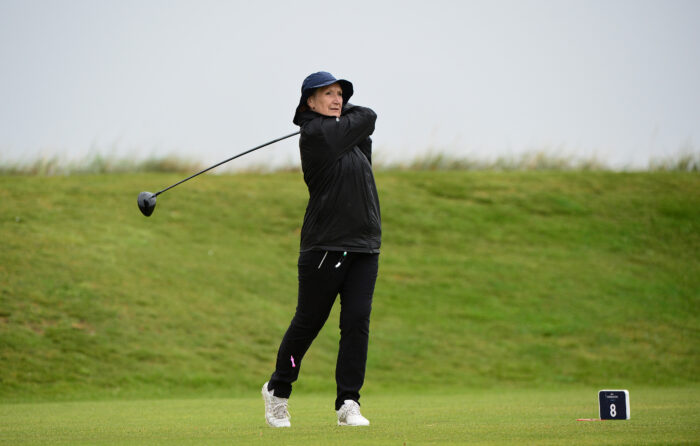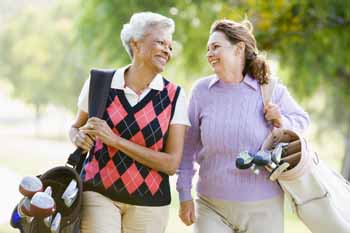Study finds golf improves muscle strength and balance in elderly people
A new international research and potentially far-reaching study has found evidence to suggest that golf provided improved muscle strength and balance in elderly participants.
The Strength and Balance Study, backed by The R&A, was carried out with two sample groups over two years by Professor Maria Stokes OBE at the University of Southampton and Dr George Salem at the University of Southern California (USC).
It indicated that older golfers have and develop strength and balance benefits.
The Southampton group involved 152 individuals aged 65 to 79 and over 80 and set out to demonstrate the physical and psychosocial benefits associated with playing recreational golf regularly by comparing physical measures between older golfers and sedentary non-golfers.
A study at the USC was undertaken to see if non-golfers developed these benefits while undertaking a 10-week instructional golf training programme. The USC group involved 15 individuals aged 63 (+/- five years) at a municipal course in the greater Los Angeles area, which also examined the feasibility, safety and adherence of the programme for senior non-golfers.

Ann Bancroft of Hinckley Golf Club plays her tee shot to the 8th hole during the R&A Coronation Foursomes at the Eden Course, St Andrews on September 9, 2019 in St Andrews, Scotland. (Photo by Mark Runnacles/R&A via Getty Images)
The evidence suggests golf can improve quality of life through muscle strengthening, improved balance, aerobic exercise (equivalent to gym-based work or yoga) and social interaction.
The combined findings show that:
- Participants in the golf training programme improved their muscular strength, power, endurance, balance, flexibility and walking performance
- Golfers under the age of 80 had better strength and balance than sedentary non-golfers of similar ages
- Golfers had better dynamic balance and static balance than non-golfers
- Strength of limb muscles and balance were better in golfers than non-golfers such as indicative through gripping and swinging a club, walking, squatting
- The golf training programme was feasible and effective; novice golfers were able to play nine holes of golf by the 10th week and completed 282 of 300 (94 percent) total training sessions
- The physical demands recorded during a golf round were equivalent or greater than the demands for other common activities, for example gym work or yoga
- Participants benefited from green space, social interaction and walking over hilly terrain
- The programme was safe; there were no golf-related injuries or adverse events.
Ahead of the study being peer reviewed to validate findings and future presentations made to the academic world, Professor Maria Stokes said: “The findings indicate that golf is associated with health benefits related to better muscle strength and balance.
“This suggests golf may meet World Health Organization recommendations for older people, which would potentially qualify golf for social prescription and exercise referral schemes among policy makers to help manage health conditions.”

Dr George Salem added, “Our findings suggest that golf should be considered when prescribing exercise for older adults because it appears to be safe, feasible and an adherent form of exercise for a better, healthier quality of life.
“Moreover, as golf is an exercise activity that includes strengthening, power, balance, endurance and cognitive challenges, it satisfies the recommended physical activity guidelines of the World Health Organization, the American College of Sports Medicine and UK guidelines.”
Martin Slumbers, chief executive of The R&A, said, “These findings should encourage policy makers and healthcare professionals to consider recommending playing golf to older people as part of encouraging them to adopt a more active lifestyle, as well as tackling physical inactivity to reduce healthcare costs.
“We are seeing more and more evidence that golf can provide significant physical and mental health benefits for participants as a moderate intensity activity and so we will continue to advocate these in all of our work with golfers, national federations and associations, healthcare professionals and policy makers.”
Dr Roger Hawkes, executive director at The R&A’s Golf & Health Project, added, “The evidence from this study is indicative that golf helps strength and balance, with no previous research to highlight this to the golf industry until now. The overall findings and benefits should be of great value for golfers and non-golfers going forward.”
The Chairman of the All-Party Parliamentary Group for Golf, North Warwickshire MP Craig Tracey, has also welcomed the results.
He said: “As The R&A has reported, muscle strength and balance exercises form an important part of the World Health Organisation’s recommended guidelines to tackle physical inactivity in older people. In parliament, we have heard about the physical and mental health benefits of golf and it is good to see evidence supporting that. This will go a long way to further the argument for physical activity, and specifically golf, to be available through the NHS to reduce healthcare costs long term, and promote longevity in the UK’s population.”















Done correctly ? Sure, absolutely ! Problem is, elderly participants need more lessons to check bad habits !
Wonder if I can now get away with another round each week on health grounds?